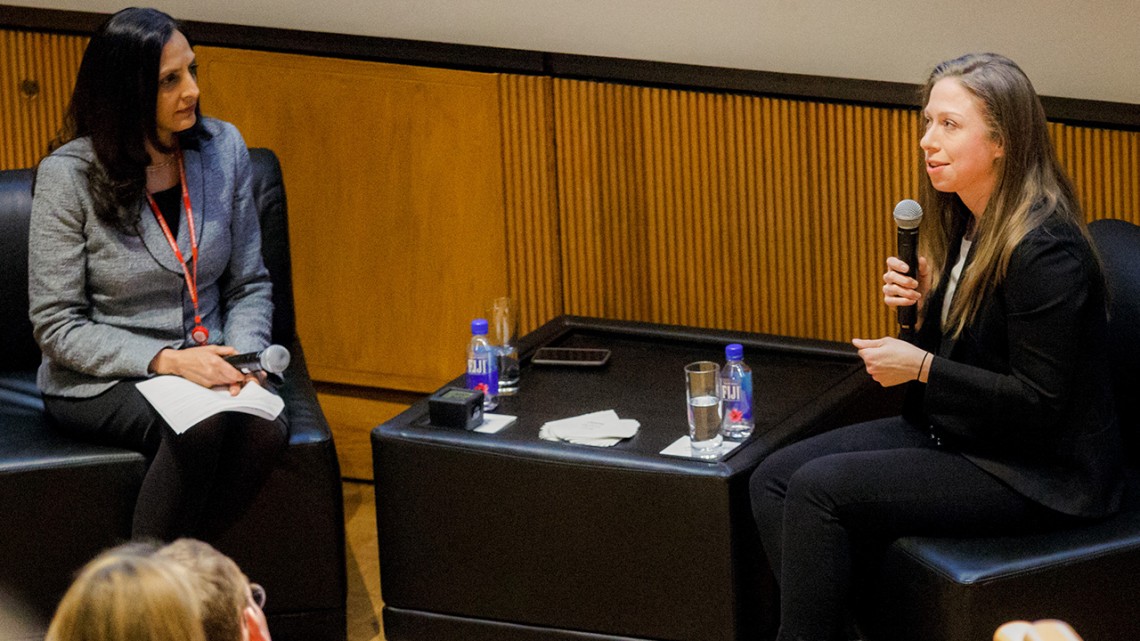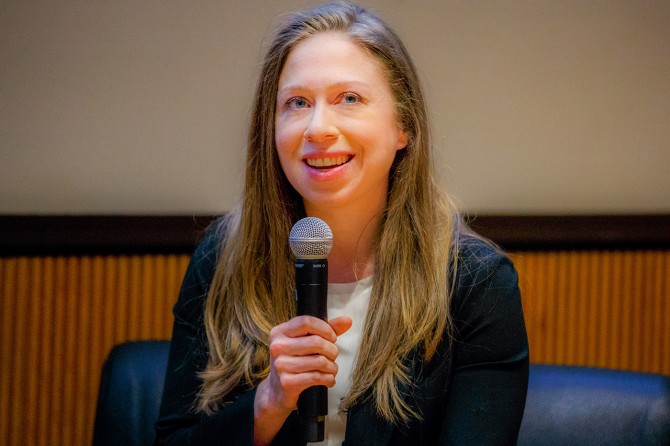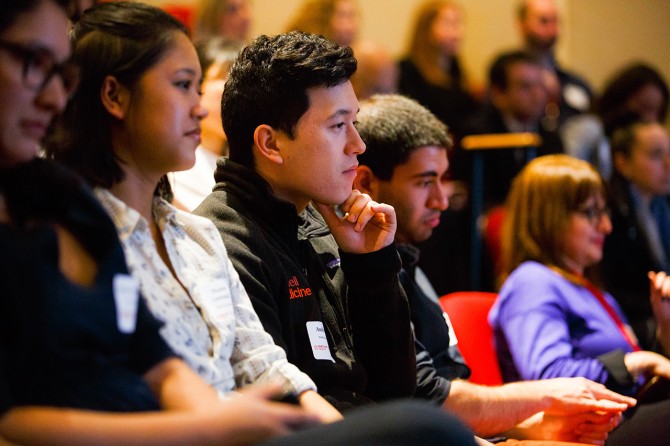
Dr. Rainu Kaushal moderates a discussion with Chelsea Clinton Feb. 5 at Weill Cornell Medicine.
Chelsea Clinton shares insights on public health
By Kathryn Inman
Chelsea Clinton is a public health advocate, researcher and educator. But being a mother has deepened her passion for children’s health, she explained in a talk on Feb. 5 at Weill Cornell Medicine.
Clinton, a member of the Weill Cornell Medicine Board of Overseers, spoke to students and faculty about her passion for children’s health as part of the Luminaries in Healthcare Leadership series, during which industry leaders share their perspectives and expertise on cutting-edge issues related to the rapidly evolving health care industry.
In a conversation with Dr. Rainu Kaushal, chair of the Department of Healthcare Policy and Research, before a small audience of invited guests, Clinton highlighted the genesis of the Clinton Foundation, the nonprofit organization founded by her father, former U.S. President Bill Clinton, where she serves as vice chair, and its work in public health and advocacy. She discussed the value of mentorship and those who influenced her life, her academic career, and the importance of work-life balance.
During her talk, Clinton, who has a Master of Public Health degree and a doctorate in international relations, discussed what she sees as the troubling rise in anti-science rhetoric and the damage it can do to public health. “I think one of the challenges that we see across health and science policy broadly is this reaction against evidence and data,” she said. “I never imagined in 2000, when the Centers for Disease Control and Prevention effectively declared victory over measles in our country, that we would be sitting here in 2019 with multiple outbreaks in multiple places across our country.” And while she notes that the intent of most parents who don’t vaccinate their children is not to harm the greater population, awareness of the potential damage of vaccine avoidance must increase.
“Every parent, I’m convinced, loves their children and wants to do what’s best, and many cannot because of circumstance,” she said, “but ignorance should not be an option.”
The Luminaries in Healthcare Leadership series is organized by the Executive MBA/M.S. in Healthcare Leadership program, which offers a Master of Science degree in health care leadership from the Weill Cornell Graduate School of Medical Sciences and a Master of Business Administration from Cornell’s Samuel Curtis Johnson Graduate School of Management to equip health care professionals and leaders with the skills and experience to facilitate change and drive innovation in the industry. Students learn how to address challenges and opportunities related to health care systems, payment models and regulatory requirements, in order to effectively drive national dialogue and spearhead initiatives in health care policy and delivery.
“Chelsea Clinton is a passionate advocate for public health,” said Kaushal, who oversees the program at Weill Cornell Medicine and moderated the event, and was introduced by Johnson Graduate School of Management Dean Mark Nelson. “She has launched high-impact initiatives at the national and global level, and has been especially committed to improving the health and opportunities for children through policy, research and education. We are grateful that she so candidly shared her personal journey with our students.”
Another of the many children’s health issues Clinton is currently focusing on is childhood obesity. With the Alliance for a Healthier Generation, a nonprofit founded by the Clinton Foundation and the American Heart Association, she is working to increasing health and wellness by emphasizing healthier food options and increased physical activity in schools nationwide.
When asked how she chooses where to spend her time, given her busy agenda and her professional, academic and personal commitments, Clinton said she ultimately follows the same criteria. “One, am I compelled by the mission, what an institution is doing? Two, do I think I have something to contribute to the mission? And three, candidly, are the people who are already a part of that mission people that I want to spend time around?
“So most of what I do is related to health,” she continued, “and the things that are not are largely organizations or efforts driven by people that I really respect and I want to help and learn alongside. So I’m just thankful that I get to do the things I do.”
Kathryn Inman is associate editor for Weill Cornell Medicine.
Media Contact
Get Cornell news delivered right to your inbox.
Subscribe


